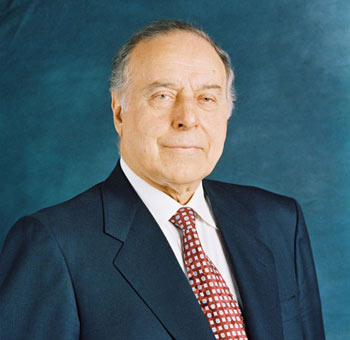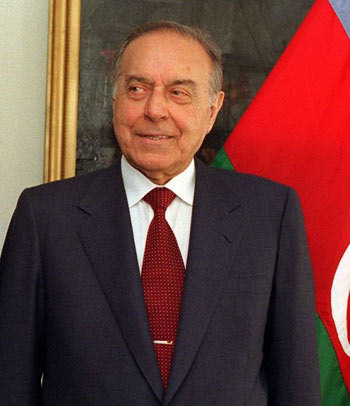Home page
» PRESIDENTS
» Heydar Aliyev
Heydar Aliyev Heydar Alirza oglu Aliyev, the Nationwide Leader of Azerbaijan was born on May 10, 1923 in Nakhchivan city. After graduating from Nakhchivan Pedagogical School in 1939, he studied architecture in Azerbaijan Industry Institute (now Azerbaijan State Oil Academy). Due to the outbreak of World War II, he left his education unfinished. After working as the head of department in The Nakhchivan ASSR Popular Internal Affairs Commissariat and Nakhchivan ASSR People’s Commissars Soviet, he was sent to work in the state security bodies in 1944. He received special high education in Leningrad (now St. Petersburg) and graduated from the History faculty of Azerbaijan State University in 1957. In July 1969 plenary session of Azerbaijan Communist Party Central Committee, Heydar Aliyev was elected the first secretary of Azerbaijan Communist Party Central Committee. In December 1982, he was elected member of the Political Bureau of Soviet Union Communist Party Central Committee and was appointed the first deputy chairman of USSR Soviet of Ministers. In October 1987, Heydar Aliyev resigned from his posts as the sign of objection to the policy conducted by the Political Bureau of Soviet Union Communist Party Central Committee and personally by the General Secretar Michael Qorbachov. In January 1990, the next day of the bloody tragedy committed by the soviet troops in Baku, in his statement in the representative office of Azerbaijan in Moscow, he demanded to punish the organizers and executors of the crime, and protesting against the of the USSR leaders in connection with the Daglig Garabakh conflict left the Soviet Union Communist Party in July 1991. Heydar Aliyev returned Azerbaijan and at the same year (In July 1990) was elected the member of Nakhchivan Supreme Soviet. He was the chairman of Nakhchivan Supreme Soviet and the deputy chairman of Azerbaijan Republic Supreme Soviet in 1991-1993. In 1992, he was elected chairman of New Azerbaijan Party in the foundation congress held in Nakhchivan. On June 15 1993, H.Aliyev was elected the chairman of Azerbaijan Supreme Soviet and on July 24, with the decision of Azerbaijan Parliament, he began realizing the authorities of the President of Azerbaijan Republic. Heydar Aliyev died in the Clivland hospital of the United States of America on December 12, 2003 and was buried in the Honorary Alley in Baku. Heydar Aliyev’s awards, prizes, and honorary names: • Red Star order; • Hero of Socialist Labor (twice); • Yaroslav Mudrı order, the supreme award of the Ukraine; • Y.V.Andropov prize (Russia) • Saint Apostol Andrew Pervozvannı order (Russia), • Supreme Award of the “Golden Fortuna” International Rating Organization- “Golden Star” (“Glory populi”) supreme award • Professor and real member of the safety, Defense and Rule of Law Problems Academy of the Russian Federation; • “Honored professor” honorary name of Moscow State University. Heydar Aliyev’s main services in the first term of his leadership (1969-1982) • Preventing realization of the May 7, 1969 order given by the Supreme Soviet Presidium of Azerbaijan SSR, on giving more than 2000 ha Azerbaijan lands to Armenia; • The construction of the “Baku Household Air Conditioning”, Baku electric mashine-building, household refrigerators, radio, robot, calculating devices plants, Sumgait compressor, Gandja “Bullur”, “Azon”, “Alunite” plants; • The construction of the Palace named after V.I.Lenin (now the Palace named after H.Aliyev); • The construction of settlements of the 8th km, Musabekhov, Bakikhanov, Ahmedli, Guneshli, Merdekan, Hovsan, Khirdalan; • The construction of the 4th, 6th, 7th, 8th, 9th micro-regions; • The foundation of the independent pedagogical institute in Khankendi on the basis of the affiliate of Azerbaijan Pedagogical Institute; • The construction of “Murov road” to Kelbecer (H.Aliyev frustrated the plans of armenian nationalists by strengthening the economic position of Kelbecer with the construction of “Murov road”); • The prevention of raising Garabakh problem again; • The establishment of specialized Republic boarding school named after C.Nakhchivanski; • The foundation of Cosmic Research Scientific Production Association in Baku; • Putting into operation Baku-Grozni oil pipeline (via this pipeline, which was put into operation in 1983, Azerbaijan joined the united oil pipeline of the USSR and the Siberian oil began flowing to Baku); • Putting into operation Shemkir Hydroelectric station.  H.Aliyev’s main services during the II period of his leadership (1993-2003): • Horadiz settlement of Fuzuli region was taken back from the Armenians; • As a result of H.Aliyev’s intense efforts, a ceasefire was achieved with the mediation of OSCE’s Minsk group and Russia; • “Contract of the Century” was signed between Azerbaijan and the leading oil companies of the world; • The first Constitution of Azerbaijan Republic was adopted with a referendum; • Capital punishment was abolished in Azerbaijan; • National manat was declared the only means of payment; • The International Baku Conference was held on the restoration of historic “Silk Road”; • 54 countries supported the territorial integrity of Azerbaijan Republic in the OSCE’s Lisbon summit. • A Decree was signed on holding the 1300-year jubilee of “Kitabi-Dede Qorduq”; • The International Baku Conference on the historic “Silk Road’ was held; • The I Congress of World Azerbaijanis was held in Baku; • The Nakhchivan department of Azerbaijan National Academy of Sciences was established; • The first Olympic sport complex was opened in Baku; • The first private secondary school – Modern Education Complex was built in the Republic; • Azerbaijan was accepted to the associative membership of the NATO Parliamentary Assembly in NATO’s Prague summit; • The State Committee was established on work with the Azerbaijanis living abroad. • Azerbaijan Republic became one of the members of the GUAM organization; • The Contract on the construction of Baku-Tbilisi-Ceyhan oil pipeline was signed in the OSCE’s Istanbul summit; • The Foundation of the Azerbaijan portion of Baku-Tbilisi-Ceyhan main export oil pipeline was laid in the Sengechal terminal; • An agreement was reached on exporting the Kazakhstan oil through Baku-Tbilisi-Ceyhan pipeline.
|
